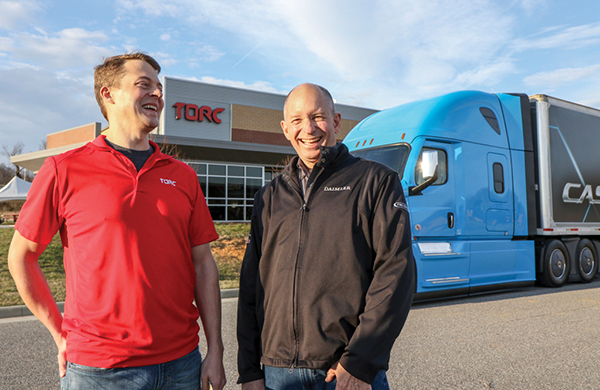Want a front-row seat to the national truck manufacturing resurgence? Pay a visit to the small North Carolina county that gave us Food Lion and Cheerwine.
If you haven’t been to Rowan County, about 40 minutes north of Charlotte, then you’ve missed one of the more remarkable economic turnaround stories of the past decade.
“Like a lot of communities across the country, Rowan County took it hard on the chin during the economic downturn,” says Greg Edds, chairman of the Rowan County Commission. “Manufacturing jobs left by the thousands and our communities were devastated. The challenge we’ve taken on is to modernize and rebuild our economy and our workforce while also retaining the distinct character that makes our community so attractive.”
Fast-forward a decade from the Great Recession of 2009 and what you’ll see is a county of 140,644 people who believe in miracles. Fueled by America’s first 10-gigabit-per-second internet connection, a network of six community colleges, workforce training assets that are best in class, and a suddenly revitalized automobile and truck manufacturing sector, Rowan County is a case study in what can happen when people refuse to stay mired in defeat.

Evidence of this dramatic turnaround is everywhere, spearheaded by the rapid growth of firms engaged in every part of the heavy-truck supply chain. At the top of that chain is Freightliner, a division of Daimler Trucks North America and the country’s biggest producer of long-haul trucks. Its Cleveland plant in Rowan County employs 2,450 workers and has added about 800 new employees in the past five years.
Construction began on Freightliner’s new logistics operation building in 2017 and is continuing. Upon completion, the facility will consist of 120,000 sq. ft. of warehouse space including kitting areas and offices. The $27.1 million plant investment is just one of several automotive sector investments popping up throughout the county.
‘A Competitive Place to Do Business’
When asked why Daimler chose to invest heavily into its truck plant in Cleveland, plant manager Erik Johnson says, “Rowan County is definitely pro-business. Its leadership and the economic development team at RowanWorks regularly meet with Daimler Trucks North America management to proactively identify needs, challenges and solutions to produce a world-class product in a world-class facility by world-class employees. That coordinated dialogue truly embodies a public-private partnership that ensures success for all stakeholders: the company, the workers, the county and the state. More importantly, it drives investment to Rowan County because it is a competitive place to do business.”
Johnson says Daimler’s investment into the Cleveland plant would not be possible without the workforce training assistance his company receives. “Working in partnership with RowanWorks, North Carolina has customized training programs to meet specific needs of employers like Daimler Trucks North America,” he says. “Its NCWorks Apprenticeship Program, NCWorks Incumbent Worker Training grants, and on-the-job training programs all complement those customized training programs to ensure current and potential Daimler Trucks North America employees have critical skills necessary to compete in the global economy.”
The Cleveland Truck Manufacturing Plant was established in 1989 and is the largest Freightliner Trucks assembly plant in the U.S., producing several Class 8 truck models including the Cascadia, Argosy, Coronado, Columbia, Western Star 4700, Western Star 4900 and Cascadia Natural Gas. Freightliner sells over 190,000 trucks a year and ranks as the top-selling semi-truck company in America.
Freightliner’s investments are being fueled not only by Rowan County’s cost-competitive business climate, but also by increasing demand for big rigs. Statista forecasts that Class 8 truck sales in the U.S. will hit almost 220,000 units in 2020. Meanwhile, Freight Transportation Research Associates Inc. (FTR) raised its North American Class 8 truck factory shipments forecast to 350,000 units, which would represent a one-year rise of about 8%. Experts say this will be the best year for truck shipments on the continent since 2006.
Other critical cogs in the truck manufacturing supply chain in Rowan County are benefiting from this bump. Among them is Agility Fuel Solutions, which consolidated five plants across North America into a new operation in Salisbury about four years ago. The $20 million investment created 200,000 sq. ft. and about 180 new jobs.
“We are very close to Daimler and do a lot of business on their Freightliner trucks,” says Bryan Mewhort, director of operations at Agility Fuel Solutions. “Our new powertrain division in Salisbury is now centrally located to Freightliner and Thomasville Bus in High Point, as well as Volvo Trucks further north [in Pulaski County, Virginia].”
Agility could be positioned for additional growth; it has just been acquired by Norway-based Hexagon, one of the firm’s principal investors.
“We have seen tremendous growth over the past nine months,” says Mewhort. “Current back orders are as strong as they have ever been. We have seen a lot of adoption of clean fuel by large fleets. More of them are moving into the clean fuel space.”
Custom Training Fills Gaps
Agility supplies compressed natural gas systems for clean-burning fleets. It also supplies propane fuel systems. Alternative fuel is currently 1.5 to 2 percent of the truck market, but it’s growing rapidly, Mewhort notes.
“We increased our staff from 115 to 180 in 2018, mostly in direct labor and material handling areas,” he says. “We enjoy an ample supply of workers here in Rowan County. We get numerous resumes for positions whenever we post our job openings online. Rowan-Cabarrus Community College has been very helpful in providing training for us. They provide all different kinds of training and can even customize training to fit our needs.”
Below-average costs of doing business and low cost of living make the area attractive, he adds. “Plus, Rowan County has been extremely supportive of our growth. The company has been very happy to have relocated to this area. It has been a very positive experience.”
They are not alone. New York Air Brake, a manufacturer of freight and locomotive air brake control systems, began operations earlier this year in its new Summit Corporate Center facility. The 100,000-sq.-ft. plant creates 94 new jobs in Rowan County. Amrep, a California firm which manufactures garbage trucks, announced recently that it is less than 60 days away from expanding its production capacity by opening its second facility in Rowan to serve the company’s East Coast customers.
Rod Crider, president and CEO of the Salisbury-Rowan Economic Development Commission, says that none of these expansions would have occurred without a willingness by community leaders to embrace change on the heels of the historic recession.

“Working in partnership with RowanWorks, North Carolina has customized training programs to meet specific needs of employers like Daimler Trucks North America.”
“The impact was deeply felt with the loss of some key employers and the resulting increase in unemployment rates and the number of persons living in poverty,” says Crider. “It did, however, jolt the community into action, leading to the development of programs to address the structural issues and increased collaboration among organizations to promote economic growth.”
Being on Interstate 85 between Charlotte and Greensboro puts Rowan in the center of a prime Southeastern distribution corridor, something that manufacturers and logistics operators covet. “Our strategic location between these two major metro areas provides unparalleled access to workers in numbers not found anywhere else in North Carolina,” says Crider of the 4-million-resident market that offers 1.4 million workers. “We’re centrally located on the East Coast and midway between Atlanta and Washington, D.C. We’ve taken advantage of that location on I-85 by developing industrial parks with easy access to the interstate, developing workforce programs and communicating our resulting cost advantage to those in the industry.”
‘Be Part of Something Real’
Manpower reinforced these assets when it released its second-quarter labor forecast in mid-March, showing nearby Greensboro as one of the nation’s hottest markets for job seekers. It also forecast transportation and utilities, and wholesale and retail trade, as two of the strongest jobs sectors — both of which translate into increased demand for trucks.
County Commission Chairman Edds says it’s important for Rowan County to stick to its mantra of “Be an Original” if it wants to see this turnaround continue. “We watch a lot of communities trying to copy one another, some even trying to be something they’re not,” he says. “We believe that people and companies want to be part of something real, something genuine, something original.”
In Rowan, that means providing the kind of business climate and lifestyle that growing firms in the truck manufacturing supply chain want.

